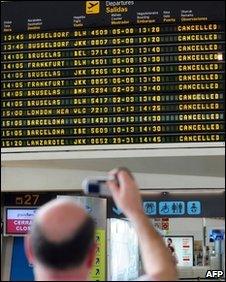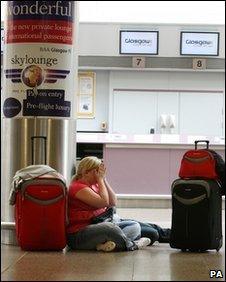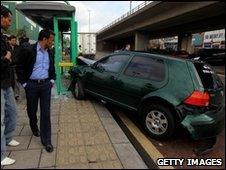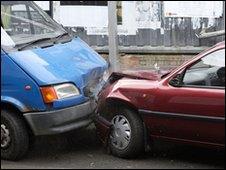Insurance problems: your questions answered
- Published

Jonathan Walker
The disruption to airline travel caused by the Icelandic volcano dust has highlighted the importance of making sure your travel insurance covers what you expect.
Tens of thousands of people have found that their policies do not.
When it comes to travel insurance, policies that cover all eventualities are not standard.
And the importance of reading the small print, and checking the cover in advance, applies to other forms of insurance too.
We asked you to email us with your questions on any aspect of buying insurance and Jonathan Walker of insurance brokers Towergate answers a selection of them here.
Q1. Can you tell me if we can buy travel insurance that will cover us against disruption due to volcanic ash? We are travelling to Singapore and Bali in September. Peter Johnson, Manchester.
The situation seems to be changing almost daily although a few insurers are producing policies that would cover this event, but they are difficult to find.
Some of these insurers have a 28 day waiting period before cover will apply, although this should be suitable for your September holiday.
However, in general this volcanic eruption is no longer an unexpected event and insurance is for the unexpected.
According to the British Insurance Brokers' Association (BIBA) about half of all existing travel insurance policies will pay for delay and cancellation if the policy and the holiday was purchased before the April eruption.
You should contact your local insurance broker who will be able to help identify which insurers can provide cover for disruption due to volcanic ash.
A broker can also talk you through the different types of policies available which can save you the hassle of trawling through policy wordings and websites.
You can also seek further information on the volcanic ash disruption by visiting the Foreign and Commonwealth or the Civil Aviation Authority websites
Q2. We are about to go to Turkey on holiday. The holiday was bought before the volcanic ash disruption as flight and separate accommodation. We are now concerned if there are flight cancellations we won't be covered. I can't find an insurance company to cover our costs should we get stranded. Any advice? Pauline Jones, Shrewsbury.
Liese Stanley from Portishead, Lisa Purkiss from Beaminster, and Paul Ainsworth from Liverpool asked similar questions.

Many passengers found their insurance did not cover volcano ash delays
It is always better to buy your insurance at the time of booking your holiday to ensure you get the maximum protection.
You will also be more vulnerable if the trip has not been booked as a package from one supplier, but in separate parts.
You should still buy insurance to cover all the other risks of medical/personal accident/baggage/cancellation and delay but the ash risk will not be covered under new standard policies until the volcano is classified as dormant.
We are starting to find that a few insurers are producing policies that would cover this event, but they are difficult to find and some may have a 28 day waiting period before cover will apply.
Q3. If you are ill or injured aboard and your insurance company refused to payout what could you do to get back home. Tom Jones, Rochdale.
In the unusual circumstances that an insurance company declines your claim, a 24-hour medical assistance company will often provide help to you by making all the appropriate arrangements, but they will need someone to guarantee the costs in advance.
Your broker can help with presenting this claim to the insurer and you also have the right to complain to the Financial Ombudsman Service (FOS).
Q4. My wife and I recently returned from Las Vegas where our return was delayed by six days. We were advised not to go to the airport but to keep phoning the airline. Our claim was rejected by our insurer who said we did not book in. They have referred us to the airline for compensation. We paid £175 for annual trip insurance. Brian Harris, Kenilworth.

Some stranded passengers had to make their own arrangements to get home
According to the Financial Services Authority (FSA) rules, insurers are required to treat customers fairly.
In this case it seems that it was not possible to check in and if you had checked in it would not have had any effect on the outcome of your circumstances.
Often insurers will not apply an exclusion or condition to a claim if failure to comply with it has not had any material effect to the value of the claim.
So it may be worth referring this on to the Financial Ombudsman Service to seek their opinion.
You will also need to get written proof of the cancellation from the airline as evidence.
In general there is some level of protection under European legislation within rule EU261/2004 which places some liability on the airline to provide accommodation and food to you in the event that your flight is cancelled or delayed, subject to some limitations.
If it is cancelled before you depart, you can be allowed to rebook at your convenience. However not all airlines seem to be doing this.
Q5. Six months ago I took out motor insurance on a transit type van. I had full no-claims bonus at the time from previous cars. Recently I changed insurance back to a car and was told I could not use my no-claims bonus because it had come from a commercial policy; but after a year paying a huge premium I could use my full no-claims bonus again. Is this correct? Ian Simpson, Lancaster.
The possibility of switching a no-claim discount from a private car policy to commercial vehicle insurance will vary from insurer to insurer.
Providing the previous vehicle has been disposed of and the no-claim discount is 'available' some will agree to transfer the entitlement to the new policy.
However it would be sensible to check with your current broker first.
Even if the insurer does not accept the official no-claims bonus from the van, they may still give you a very large introductory bonus for your car.
Q6. I had a non-fault claim going through on my car insurance. The claim was resolved and I received a cheque which was banked on the 27 April. I have since bought another car and tried to insure this on the 4 May but I was advised the price was more than double what I was paying. When asked why, they advised it was because my claim was outstanding and the broker needed to receive confirmation from my insurer that the claim is closed before I can insure my new car at a normal insurance price. My car is sitting on my drive uninsured and I am having to use public transport. I have also asked for the return of the previous seven weeks of insurance I have paid but had no car to insure - but they told me they do not refund this. Beverley Ringland, Bolton.

Car accidents can lead to extra costs, even when they are not your fault
If you are involved in an accident and your insurer can recover its costs (perhaps for the damage to your car) from the responsible party and you also recover any out of pocket expenses (e.g. cost of using public transport) your no-claim discount will be allowed.
In this instance it is possible that your insurer is still waiting to recover the cost of its part of the claim.
Generally if the policy is still in force the cover can be transferred to your new car, although there may be an increased premium to pay if the car is rated in a higher group perhaps due to its value or performance.
The insurer will unfortunately not refund part of the premium for the period when you have no vehicle.
The effect of your no-claims bonus being reduced should not occur until renewal, therefore we assume your renewal date fell in between the accident and purchasing your new car.
Now that you have made a recovery, the insurer should reinstate your no-claims bonus.
It has a regulatory duty to treat customers fairly so your premium should reduce accordingly.
Q7. If I have to attend court to defend a motor claim, who is liable to cover the costs of attending, including loss of income of £300 a day? Is my insurer not expected to cover these costs irrespective of the outcome of the trial? Irfan Sabir, Manchester.
There is no cover under the standard motor policy to include the costs of attending court to defend a case.
However if you have legal expenses insurance this may help in these circumstances.
If it can be proved that another party was responsible for the accident you should be able to recover out-of-pocket expenses in connection with the incident.
Q8. My daughter recently had a car accident. She was stationary at traffic lights when a white van crashed into her causing a lot of damage. She had fully comprehensive insurance and although this was not her fault she still had to pay her excess to get her car repaired. She has since had this refunded. Eventually Mr White Van Man's insurance company accepted liability for the damage. Will this affect her premium which is due in September, because being a student she is understandably stressing about this and loves her car. Eileen Knowles, Sunderland.

A crash will not necessarily affect your no-claims bonus
As your daughter recovered her excess, and White Van Man's insurers paid for the damage, your daughter's no-claim discount should not be affected.
Indeed if she is not currently entitled to the maximum number of years bonus, a further year should be added at the renewal date despite the accident.
However if your daughter's insurers are not currently aware of the recovery it would be best to provide them with documentary proof.
If you feel that your daughter's premium is too high, you should speak with an insurance broker who can help you find alternative quotes.
Q9. Why did my car insurance rocket this year? Last year I paid £177. This year the quotes were £300. I had to settle at £245. There were no differences in my cover or car. I tried reducing my mileage to make it cheaper. 10,000 miles to 2,000 miles made a £9 discount. Not much incentive to take public transport or use the car less. Steve, Exeter.
Motor insurers are currently experiencing underwriting losses in the region of £120 for every £100 of premium collected from clients so inevitably rates have increased.
However, they have not increased that much!
It is always advisable to compare costs and cover as there can be large differences from one insurer to another.
Other methods of reducing the premium would be to pay for the first part of damage to your vehicle e.g. £250 (known as the excess), restricting the number of drivers and garaging the vehicle.
Q10. Why do you lose your no-claim bonus, when your car is stolen? Lewis Fitzroy, Cardiff.
Insurers will explain that the discount is a no-claim discount not a no-blame discount.
If an accident occurs where your insurer can recover any payments that it means your no-claim discount will be allowed.
This is not possible where the car has been stolen.
Q11. We were recently attending a horse driving trials competition and during the competition a horse lost its driver and bolted through the horsebox park with the carriage still attached. It crashed into our vehicle and tent, damaging both. The competition's insurance policy says that it will only pay out if the driver of the horse was negligent - meaning that presumably if the horse was stung by a bee he would not be covered and would have to pay up himself. Can this be right? Emma Ashworth, Wakefield.

Horse riding can bring unusual risks, not just the obvious ones
The conduct of animals and legal liability in relation to injuries and damage caused is a potentially complex area and can be influenced by the personality of the animal.
The driver would need to be shown as negligent for a claim to succeed, particularly as the vehicle has been taken into an area where such circumstances might be foreseeable.
Was the competition being conducted in a restricted area surrounded by fences or barriers to ensure safety to spectators and their property?
If so, and these were insufficient, it might be possible to make a claim against the organisers.
However the exact circumstances would need to be considered and negligence proved.
If you have a comprehensive motor policy then your insurer should pay for your vehicle repairs and it will pursue a case against the third party.
Occasionally accidents happen where no one is legally at fault and it would be sensible to ask your broker for advice about a policy where you can protect your maximum no claims bonus.
If you have legal expenses insurance, the insurer can attempt to pursue any other losses such as your excess or your damaged tent.
Q12. The freehold on my flat was bought by a new company a few years back. Almost immediately, it tripled our buildings insurance premium. I think that it has entered into uncompetitive insurance arrangements in return for commission. Is there anything I can do about this? Can I at least get it to disclose how much it has been paid by the insurer? I have since found out that the company is notorious for this. Do we have any rights here? Neil, London.
It depends very much on the contract the tenant signed.
If the management company is responsible for insuring and if the fine print does not give the tenants the right to challenge in any way then unfortunately they cannot, and are legally obliged to pay.
If there is a residents' association it is well worth raising the issue with it as it may be able to seek a compromise on your behalf.
Q13. I have just moved into a new flat which I share with a friend. I've been looking around for contents insurance quotes and find that, because she is not a relative or my partner, we would have to pay higher premiums. Just to clarify, we're not students and are not living in shared accommodation with strangers - just the two of us in a privately rented flat. Is there anyway to avoid this? And if we pretended to be partners for the purposes of insurance, could this impact any potential claim? Claire, London.
Shared accommodation of this nature is deemed a higher risk (for theft) as it is assumed the living space is shared not necessarily by friends.
If you were to lie and the insurer found out during the claim process, the claim would not be met and it would be likely the policy be voided due to the fraudulent non-disclosure or misrepresentation and you would have no right to any return of the premium. This would be treated as fraud.
You should seek alternatives quotes from an insurance broker as your relationship status should not have a significant impact on your premium and some insurers do not charge any extra at all.
Q14. I have just discovered a leak in my shower. It is above a shop. I phoned my insurer yesterday and it said I would have to pay £350 upfront. I have not got this type of ready cash. It said I could cancel the policy if I wanted. I have never made a claim against this policy. I pay £35 a month for the privilege of having home insurance. Pat Hartey, Scotland.

Check the excess, or the policy may lead to you springing a financial leak
We often see this problem with people buying direct from an insurer over the internet.
Insurers have a duty to disclose at point of sale, all information that would influence your buying decision.
Excesses can vary dramatically and is a key piece of information that you should know when buying the policy.
Did your insurer make it clear what the excess was?
If not, make a complaint to it and if that is not dealt with to your satisfaction then go to the Financial Ombudsman Service.
Q15. A builder rebuilding a neighbour's garage took off the garage door, which was stolen. The door had been left at the front of the garage, beside a public road. Is the house insurance company liable for the loss, or is the builder liable for the loss under his all-risks erection insurance policy? Peter Marton, Middlesbrough.
As it is an unusual situation I would always raise the question and get confirmation from the broker or insurer direct. It is possible that the household insurer could pick up the loss and potentially recover from the builder.
The opinions expressed are those of the author and are not held by the BBC unless specifically stated. The material is for general information only and does not constitute investment, tax, legal or other form of advice. You should not rely on this information to make (or refrain from making) any decisions. Always obtain independent, professional advice for your own particular situation.